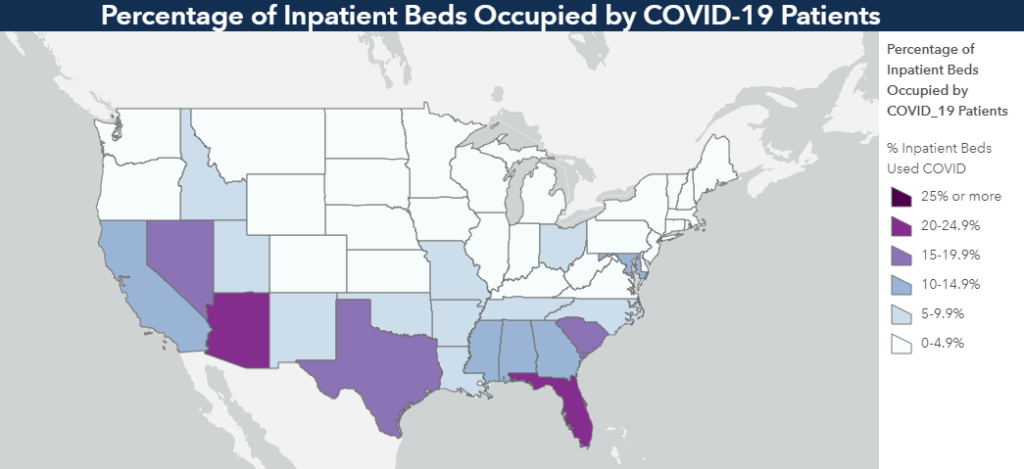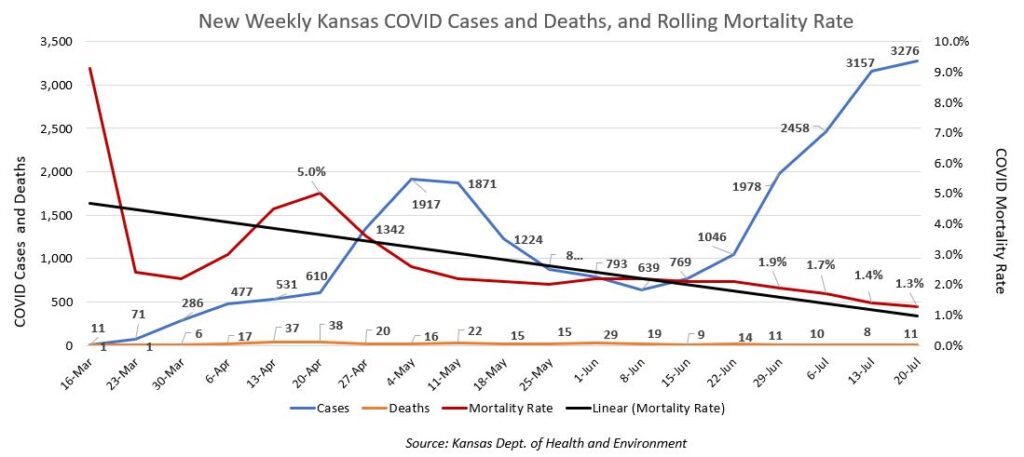The U.S. Department of Health and Human Services’ (HHS) new hospital utilization website shows utilization and available capacity for all states, and the results for Kansas and Missouri are very encouraging. Only 3% of inpatient beds in use in Kansas are being used for COVID patients and just 5% in Missouri.

The HHS Coronavirus Data Hub is a central repository for data collected by its various operating divisions, including CDC, CMS, HRSA, and others. The data is populated from hospital submissions, either reported through their state or reported through the HHS Protect site.
 As of July 22, HHS reports that only 50% of inpatient beds are utilized in Kansas, and 62% in Missouri. COVID patients account for only 3% of utilized beds in Kansas and just 5% in Missouri.
As of July 22, HHS reports that only 50% of inpatient beds are utilized in Kansas, and 62% in Missouri. COVID patients account for only 3% of utilized beds in Kansas and just 5% in Missouri.
There is also a good supply available intensive care unit (ICU) beds in both states; only 53% of Kansas’ ICU beds are in use today, and 65% are in use in Missouri.
Good news / bad news
Preventing hospitals from being overrun with COVID patients was the primary rationale for many government orders to close so-called ‘non-essential’ businesses in March and April, and fortunately, hospitals weren’t overrun. That, along with there not being a bed shortage now, is the good news.
The bad news, however, is that most hospitals laid off health care workers in droves when the cancellation of elective surgeries deprived hospitals of their most profitable services.
Kansas City’s Children’s Mercy put 575 employees on a two-month furlough in April, and 235 employees of the University of Kansas Health System’s St. Francis campus in Topeka were laid off in April. St. Luke’s Health System and the University of Kansas Health System in the Kansas City area have also announced cutbacks.
The Washington Post reports that patients are still delaying essential care out of fear of coronavirus. Many doctors urged a delay in care early in the pandemic according to the story, but now experts are warning that skipping treatment and screening tests carries its own risks and could lead to thousands of avoidable deaths.
“Cancer is going to kill a lot more people this year than COVID-19 — by a lot,” said Benjamin Neel, director of the Perlmutter Cancer Center at NYU Langone Health. “You’d have to be crazy not to go see your doctor.”
Some of the fear, however, may be unnecessarily prompted by media and government medical officials.
As reported by the Sentinel earlier this week, their hyper-focus on new cases rising ignores the good news – the rates of hospitalizations and deaths are declining.





